Summoner Character Profile: Part One
We chat with writer Jason Scott about two of Summoner's main characters, Joseph and Jekhar.
Any fan of the genre will tell you that a role-playing game is only as good as the story driving it. Oftentimes, developers of role-playing games work hard to ensure that the characters and the environments look good and that there are plenty of special effects, but the end result is a neglected storyline that fails to deliver a compelling experience. Hoping to avoid such an occurrence with the PC version of its upcoming role-playing game, Summoner. Volition not only dedicated resources to create a detailed and complex world, but it also made an equally strong effort in developing an engaging story with dynamic characters.
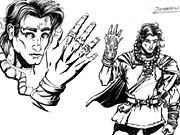
Summoner's story focuses on a young man named Joseph who, as a boy, is indirectly responsible for destroying the village of Ciran and killing most of its inhabitants. Before the destruction of the village occurs, Joseph spends his time tending the fields on the farm owned by his father, but, regardless of his otherwise normal life, controversy always surrounds Joseph because of a strange mark on his hand. Yago, an old man with a wild-eyed look, eventually makes his way into the town of Ciran, befriends Joseph, and reveals that the mark on Joseph's hand means he's a summoner. To help Joseph understand his powers, Yago gives him a black ring carved from obsidian. The ring enables Joseph to summon monsters at any time, but Yago warns Joseph that he must not summon using his full abilities--if he does, he won't be able to control the summoned beast. Unfortunately, Joseph doesn't heed the warning.
Marauders attack Ciran and its peaceful inhabitants. Witnessing the carnage firsthand, Joseph realizes his village needs help, so he looks toward his powers and summons a powerful demon. However, the demon is too powerful--Joseph can't control it, so it aids in the destruction of the village and kills many of the residents. The old man and Joseph flee to a nearby village, where they are both safe from retribution for Joseph's disastrous actions.
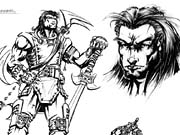
One of Joseph's closest friends in Ciran is Jekhar, a descendant of Husofi--which is an old term for hawk children. Jekhar's and Joseph's backgrounds are vastly different: Jekhar grows up in a strict warriorlike environment, since his father was a huntsman for the local lord. Of course, this gives Jekhar an excellent opportunity to hone his abilities, and, almost immediately, word of his skill in combat makes him popular with the master of arms, but other residents of Ciran begin to fear him--except for Joseph. The two quickly become friends, but just as quickly as that happens, Joseph kills most of Jekhar's family when he summons the demon to protect the village. Jekhar never forgives Joseph, and when the two encounter each other at a later point, the only reason Jekhar doesn't kill Joseph on the spot is that he doesn't want to ruin his reputation as a soldier.
In part one of this two-part Summoner feature, we speak with Summoner's scriptwriter, Jason Scott--whose previous work includes FreeSpace 2--to learn more about the characters in Summoner as well as what it was like to write a role-playing game script for the first time.
Q&A With Jason Scott
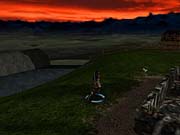
GameSpot: How did you get involved in writing the story for Summoner?
Jason Scott: I joined Volition in August of 1998. Earlier that summer, the team had started work on Summoner, which then had the catchy title of VRPG. It was then that they made the decision to hire a writer.
Sandeep Shekar, the lead designer on the project, was responsible for coordinating the story through its first few drafts, so the basics had been worked out by the time I came on board.
GS: What kinds of problems did you encounter during the scriptwriting process?
JS: My problems all boiled down to inexperience. Summoner was the first RPG I have ever written and only the second title I've ever worked on--the first was FreeSpace 2. Early in the process, I made some decisions that created a lot of work for myself down the road.

For example, the city of Lenele has literally hundreds of NPCs [nonplayer characters], most of which say something unique. A lot of this dialogue doesn't pertain to Joseph's story directly, but it helps evoke a living, breathing world with its own culture, economy, and politics. Of course, the task of tracking hundreds of NPCs through dozens of script tables turned out to be a nightmare. The overall effect was successful and unlike anything seen before in an RPG, but I'm never going there again.
GS: Did you ever reach a point where you didn't like the direction of the current story and thought about scrapping it almost entirely in favor of a new one?
JS: From the beginning of the process to the end, you're always thinking of ways to improve the story. Eventually, you get to a point in development when making a change becomes too expensive. You have to live with decisions you made earlier, even though you know the change would make the story better.
There's always the sense that "If I could start from scratch, I could make it 100 times better." I said the same thing to myself during the development of FreeSpace 2, and I expect that it will be my secret mantra for every project I work on. It's all about perfectionism, and if you want to make your ship date, you learn to get over it.
GS: Was there any specific inspiration for the overall story or any of the characters?
JS: Much of the historical detail comes from my research in medieval history. Not even the most imaginative or perverse fantasy literature can rival the atrocities people committed against each other in the past.
Among other historical works, I read Barbara Tuchman's A Distant Mirror throughout the development process. Folklore has been another inexhaustible source for ideas. I'm a big fan of George R.R. Martin's Song of Fire and Ice series, and I understand that Ursula K. LeGuin's Wizard of Earthsea was influential early in the project as well.
Fantasy paintings are also a wonderful source because the artist has fully realized his or her ideas in a visual form. The phantasmagoric images described by the monks of Iona, for example, were directly inspired by paintings. Other allusions are scattered throughout the game, but it's up to the Modern Language Association to find them.
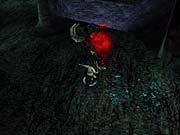
GS: The hero, Joseph, is somewhat unique in that he's not only the hero, but also the catalyst for the plot. Can you tell us a little more about Joseph and what makes him stand out from the traditional role-playing game hero?
JS: At the risk of sounding facetious, the one thing that sets him apart from the crowd is that he doesn't have amnesia. Joseph knows who he is at the very beginning. The journey is about coming to terms with that knowledge, its consequences, and its potential.
GS: Most characters within a role-playing game evolve either physically or mentally. How do you think Joseph evolves as you progress through Summoner?
JS: Joseph begins in complete obscurity, a poor and landless farmer near the bottom rung of the feudal ladder. He has no confidence in his abilities, no faith in his prophecy, and the last thing he wants to do is use his summoning power. Only the Four Riders and the invading armies of Orenia can goad him into action.
By the end of the game when he confronts Murod and his other enemies, Joseph has embraced his destiny and will do all in his power to fulfill it, beyond what any summoner before him has been able to achieve. The characters do evolve visually as well. The armor and weapons they gain by the end of the game are very shiny. I think you'll be impressed.
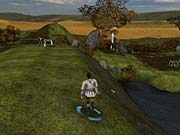
GS: Later in Summoner, Joseph meets up with his old childhood friend Jekhar. How did Jekhar and Joseph's friendship begin, and what causes Jekhar to have a somewhat distrustful attitude toward Joseph after they meet again?
JS: Joseph and Jekhar grew up together in Ciran. Jekhar's father was the huntsman for the lord of Ciran, and Joseph was the son of a poor farmer. One day, Joseph rescued the lord's favorite hound from a trap, which saved Jekhar's father [from receiving punishment]. If we ever do a "Summoner Kids" cartoon, we'll explore that back story in more depth.
When Joseph destroyed Ciran nine years ago, he destroyed Jekhar's family along with it. The survivors of the massacre--including Jekhar--spared Joseph, but they swore that they would kill him if he ever crossed their path again.
When Joseph meets Jekhar in Lenele, he learns that his childhood friend has become a soldier in the service of King Bellias. Jekhar has sworn to protect the king and uphold his laws, which prevents Jekhar from lopping Joe's head off. When the King orders Jekhar to help Joseph, he's none too pleased about it.
GS: Do any aspects of Jekhar's personality, like his strong warrior spirit, help bring out from Joseph's character any hidden or subtle aspect that the audience may not see otherwise?
JS: Good question. In a lot of ways, Joseph needs to become more like Jekhar--confident, strong, and ready to do what is required of him, even though he might not want to. Jekhar has already surrendered himself to a higher cause, something that Joseph must learn to do by the end of the game. At the same time, Jekhar hasn't gotten over this revenge thing, so he needs to learn the true meaning of Christmas by the end of the game.
GS: Thanks, Jason.
Next week, we'll continue our interview with Jason as we examine Rosalind and Flece, two other major characters from Volition and THQ's upcoming Summoner.
Got a news tip or want to contact us directly? Email news@gamespot.com
Join the conversation